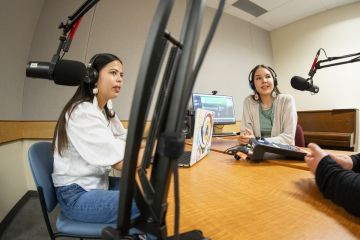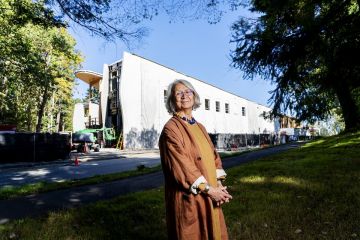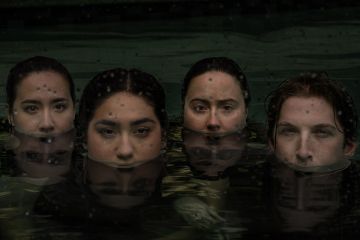Ry Moran returns
- Lisa Abram
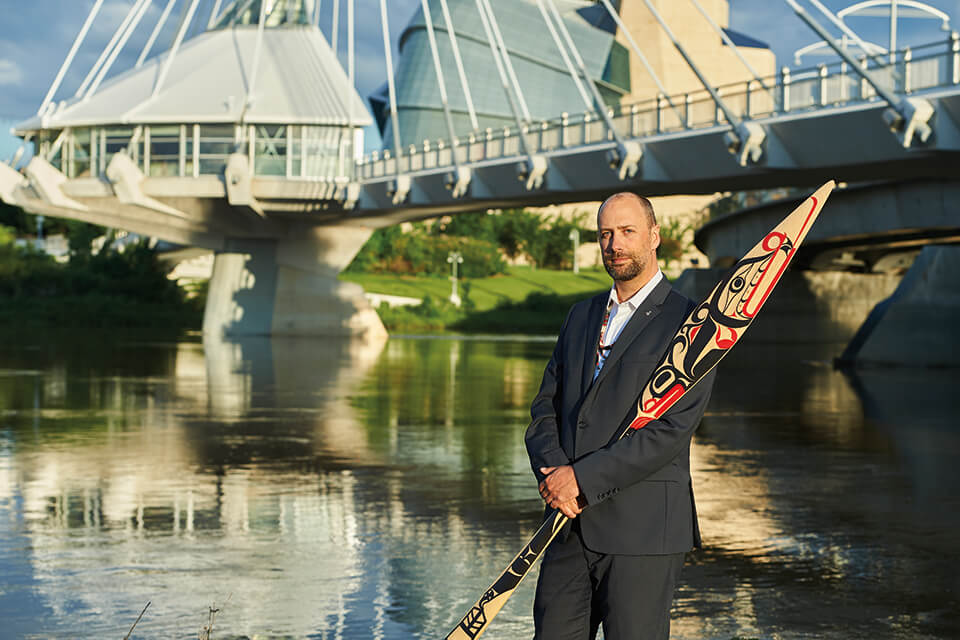
Ry Moran (BA '02) recalls wandering his Vancouver community as a boy, catching frogs, examining sunflower sea stars or fishing for salmon. He has always loved exploring. One of the many things he is hoping to share with his children in their new Vancouver Island home is the abundance of richness on the land.
Moran returned to campus last fall as the inaugural associate university librarian – reconciliation. His focus is to encourage others down a path of healing, reconciliation and human rights. The knowledge he brings to the position includes an academic background in political science and history at UVic, a gap year abroad and ten years doing the work of truth and reconciliation.
Moran took a year off from UVic to travel. On a long hike to the base camp of Mount Everest, he pondered two fundamental questions that would become key to his life’s work. He wondered: “What happened to the Indigenous peoples of Canada and their trails?” and “What are the social, economic and political factors that contributed to the world becoming so profoundly unequal?”
Moran returned to UVic hungry for the knowledge necessary to tackle these questions. Moran says he regularly draws upon what he learned in classes with professors such as John Lutz, Oliver Schmidtke and Rob Walker.
I had some incredible teachers here at UVic. It was through their classes that my eyes were opened to the long and complex histories of colonization both here and around the world. This was life-changing learning, and I’m very thankful for the time I spent at UVic.
—Ry Moran, associate university librarian – reconciliation
“I recall Ry as one of the standouts in my classes. Then I saw a thirst to learn and what seemed like a purpose,” says Lutz (BA ’83, MA ’89), a UVic history professor. “He was learning because he saw a need to make changes in our society. So many students come to university as idealists and unfortunately many leave as cynics. Ry has held on to that idealism and has changed Canadian society.”
Lutz and Moran are now colleagues developing a pathway to help the UVic community further understand the impact of colonization and its ensuing detrimental effects.
Moran’s journey has not been a straight line. In fact, none of his future roles existed when he was a student. Moran served as the Director of Statement Gathering at the Truth and Reconciliation Commission (TRC); Director of the National Centre of Truth and Reconciliation and now the inaugural Associate University Librarian – Reconciliation at UVic—all innovative positions. Prior to his role with the TRC, Moran worked on passion projects through his own company.
My career has been a continuous adventure. In terms of dream jobs, the idea of working for an organization like the Truth and Reconciliation Commission absolutely would have been top of the list… but it wasn’t even on the national horizon yet.
—Moran
Doing this work is not always easy. From statement-gathering work with the TRC, to important efforts to honour and remember the children who never returned from the residential schools, Moran has listened to thousands of hours of residential-school Survivor statements. “These statements are incredibly powerful, but they are filled with absolutely heartbreaking accounts of what Survivors had to endure at the hands of Canadian state and churches. The word genocide is not an understatement.”
Along the way, music has helped him process deeply felt emotions and songwriting provided an outlet to let things go. “I love music, plain and simple. It’s one of those things that even if I wanted to stop, I couldn’t. It’s an integral part of me and I’m just so thankful I have it in my life. It’s been kind of a bedrock support for me through this intense work over the past decade.”
Moran also has a passion for the outdoors, spending as much time outside as possible hiking, climbing, mountain biking and canoeing. Moran’s last outdoor adventure was a two-week canoe trip down the Bloodvein River in northern Manitoba with three generations of his family, including father Bill, his wife Amy, and his oldest child of two children—where they navigated 90 sets of rapids.
Connecting with the land is more than a recreational pursuit to him. “I’ve been really fortunate to have learned from a lot of knowledge keepers along the way that have taught me how to see the land and relationships embedded within. My time out on the land is not just for fun but a continual exploration of learning, law, relationship and reconciliation.”
Ongoing declines in environmental health are a major concern. “To me, there are two fundamental questions we still have to answer if we are serious about this process of reconciliation—how are we going to live together in a good way as a human family? And how are we going to live with the land in a good way? Sadly, I believe we are far from stating with confidence that we have learned to live with the land in a manner that does not continue to rob from future generations.”
Moran is comfortable listening and observing. He will build on existing relationships and form new ones in his exciting new role with UVic Libraries. “The work ahead is squarely focused on creating the opportunity for the entire team to get involved in important processes of decolonization.” Moran wants to ensure UVic Libraries is a safe and welcoming place for all people and all knowledges.
“When we look back at our collective history in Canada, there are a lot of knowledges that were not valued, protected or cherished. In fact, when we specifically look at Indigenous knowledges, Canada’s approach for decades was to attack and dismantle those knowledge systems. We have an important opportunity today to be part of the solution to revitalize these knowledge systems.”
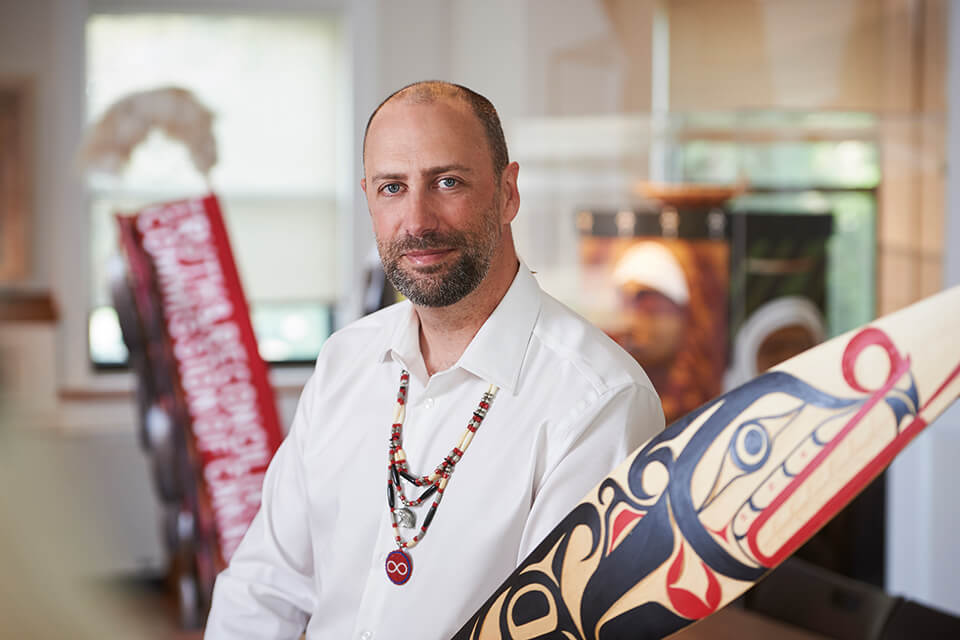
Much of the work of reconciliation belongs to non-Indigenous people, so he always starts with education. Moran recommends that UVic alumni become better informed by watching more films and reading more books, articles and scholarly publications created by Indigenous people. “UVic is at the cutting edge of some incredibly important work in the area of Indigenous resurgence, reconciliation and decolonization. I would absolutely encourage alumni to explore the work happening across UVic and to get involved by attending lectures and events or exploring ways to support these initiatives by volunteering or becoming a donor.”
A big part of why he came back to the West Coast was to have his children grow up close to their grandparents and keep family ties strong. “My parents are some of my best friends for certain,” he says. For him, the opportunity to have his family together (as much as the pandemic allows) is one of the greatest gifts of being back on the coast.
“When I think about family, I think inter-generationally. I think about all those who walked before me and all those who will walk after. I think deeply about the responsibilities I have to those generations before and still to come. This is a big source of motivation to see the changes through today that need to happen,” he says.
“Truth is not a thing you speak, it’s the way that you live.”
Photos
In this story
Keywords: indigenous, alumni, administrative, reconciliation, libraries, library
People: Ry Moran
Publication: The Torch



